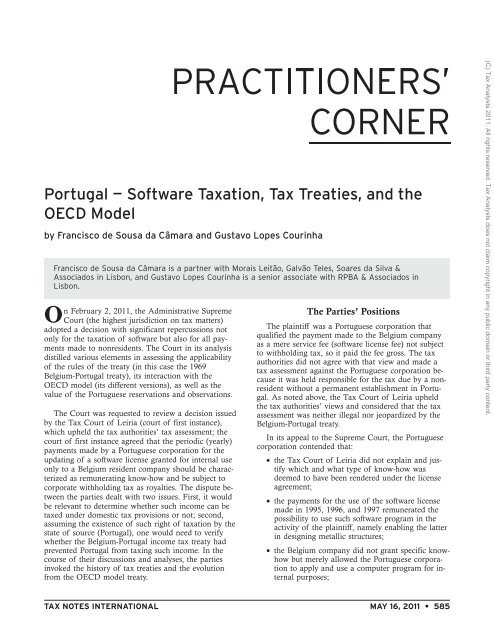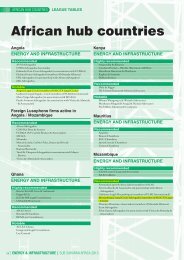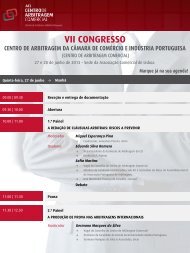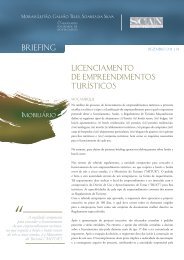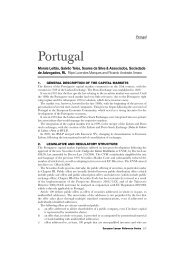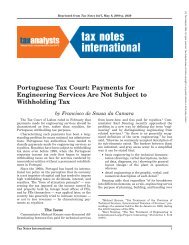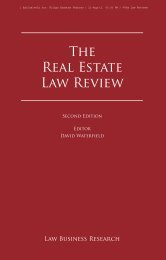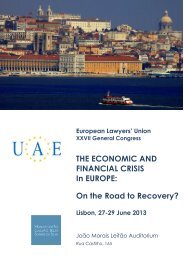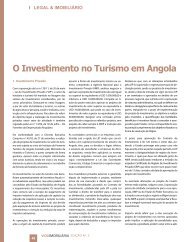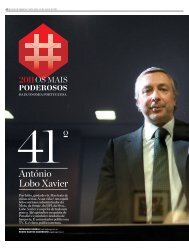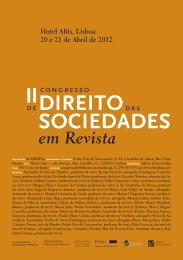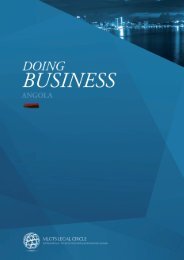Portugal â Software Taxation, Tax Treaties, and the OECD Model
Portugal â Software Taxation, Tax Treaties, and the OECD Model
Portugal â Software Taxation, Tax Treaties, and the OECD Model
- No tags were found...
Create successful ePaper yourself
Turn your PDF publications into a flip-book with our unique Google optimized e-Paper software.
<strong>Portugal</strong> — <strong>Software</strong> <strong><strong>Tax</strong>ation</strong>, <strong>Tax</strong> <strong>Treaties</strong>, <strong>and</strong> <strong>the</strong><strong>OECD</strong> <strong>Model</strong>by Francisco de Sousa da Câmara <strong>and</strong> Gustavo Lopes CourinhaFrancisco de Sousa da Câmara is a partner with Morais Leitão, Galvão Teles, Soares da Silva &Associados in Lisbon, <strong>and</strong> Gustavo Lopes Courinha is a senior associate with RPBA & Associados inLisbon.On February 2, 2011, <strong>the</strong> Administrative SupremeCourt (<strong>the</strong> highest jurisdiction on tax matters)adopted a decision with significant repercussions notonly for <strong>the</strong> taxation of software but also for all paymentsmade to nonresidents. The Court in its analysisdistilled various elements in assessing <strong>the</strong> applicabilityof <strong>the</strong> rules of <strong>the</strong> treaty (in this case <strong>the</strong> 1969Belgium-<strong>Portugal</strong> treaty), its interaction with <strong>the</strong><strong>OECD</strong> model (its different versions), as well as <strong>the</strong>value of <strong>the</strong> Portuguese reservations <strong>and</strong> observations.The Court was requested to review a decision issuedby <strong>the</strong> <strong>Tax</strong> Court of Leiria (court of first instance),which upheld <strong>the</strong> tax authorities’ tax assessment; <strong>the</strong>court of first instance agreed that <strong>the</strong> periodic (yearly)payments made by a Portuguese corporation for <strong>the</strong>updating of a software license granted for internal useonly to a Belgium resident company should be characterizedas remunerating know-how <strong>and</strong> be subject tocorporate withholding tax as royalties. The dispute between<strong>the</strong> parties dealt with two issues. First, it wouldbe relevant to determine whe<strong>the</strong>r such income can betaxed under domestic tax provisions or not; second,assuming <strong>the</strong> existence of such right of taxation by <strong>the</strong>state of source (<strong>Portugal</strong>), one would need to verifywhe<strong>the</strong>r <strong>the</strong> Belgium-<strong>Portugal</strong> income tax treaty hadprevented <strong>Portugal</strong> from taxing such income. In <strong>the</strong>course of <strong>the</strong>ir discussions <strong>and</strong> analyses, <strong>the</strong> partiesinvoked <strong>the</strong> history of tax treaties <strong>and</strong> <strong>the</strong> evolutionfrom <strong>the</strong> <strong>OECD</strong> model treaty.The Parties’ PositionsThe plaintiff was a Portuguese corporation thatqualified <strong>the</strong> payment made to <strong>the</strong> Belgium companyas a mere service fee (software license fee) not subjectto withholding tax, so it paid <strong>the</strong> fee gross. The taxauthorities did not agree with that view <strong>and</strong> made atax assessment against <strong>the</strong> Portuguese corporation becauseit was held responsible for <strong>the</strong> tax due by a nonresidentwithout a permanent establishment in <strong>Portugal</strong>.As noted above, <strong>the</strong> <strong>Tax</strong> Court of Leiria upheld<strong>the</strong> tax authorities’ views <strong>and</strong> considered that <strong>the</strong> taxassessment was nei<strong>the</strong>r illegal nor jeopardized by <strong>the</strong>Belgium-<strong>Portugal</strong> treaty.In its appeal to <strong>the</strong> Supreme Court, <strong>the</strong> Portuguesecorporation contended that:• <strong>the</strong> <strong>Tax</strong> Court of Leiria did not explain <strong>and</strong> justifywhich <strong>and</strong> what type of know-how wasdeemed to have been rendered under <strong>the</strong> licenseagreement;• <strong>the</strong> payments for <strong>the</strong> use of <strong>the</strong> software licensemade in 1995, 1996, <strong>and</strong> 1997 remunerated <strong>the</strong>possibility to use such software program in <strong>the</strong>activity of <strong>the</strong> plaintiff, namely enabling <strong>the</strong> latterin designing metallic structures;• <strong>the</strong> Belgium company did not grant specific knowhowbut merely allowed <strong>the</strong> Portuguese corporationto apply <strong>and</strong> use a computer program for internalpurposes;(C) <strong>Tax</strong> Analysts 2011. All rights reserved. <strong>Tax</strong> Analysts does not claim copyright in any public domain or third party content.TAX NOTES INTERNATIONAL MAY 16, 2011 • 585
PRACTITIONERS’ CORNER• intellectual property income obtained by nonresidentsin <strong>Portugal</strong> is subject to tax, but consideringthat software income is not covered by such conceptin accordance with Portuguese law, <strong>the</strong> proceedspaid for <strong>the</strong> license agreement are not subjectto tax under domestic tax law;• software is not considered or protected as a literary,artistic, or scientific work under Portugueselaw;• <strong>the</strong> term <strong>and</strong> definition of royalties in <strong>the</strong> 1969Belgium-<strong>Portugal</strong> tax treaty followed <strong>the</strong> 1963<strong>OECD</strong> model <strong>and</strong> did not cover <strong>the</strong> remunerationof software;• in 1992 <strong>Portugal</strong> introduced a reserve in <strong>the</strong><strong>OECD</strong> model to tax as royalties all software incomethat is not derived from a total transfer of<strong>the</strong> rights attached to <strong>the</strong> software (paragraph 43of <strong>the</strong> commentary to article 12), but this reservewas only used in <strong>the</strong> 1999 <strong>Portugal</strong>-Singaporetreaty; <strong>and</strong>• for <strong>the</strong> purposes of this case <strong>the</strong> reserve introducedin 1992 on <strong>the</strong> <strong>OECD</strong> model is absolutelyirrelevant, <strong>and</strong> does not bind <strong>the</strong> parties that enteredinto <strong>the</strong> Belgium-<strong>Portugal</strong> treaty or <strong>the</strong> taxpayersbenefiting from <strong>the</strong> treaty.The tax authority did not present any written allegationsto <strong>the</strong> Court, but <strong>the</strong> public prosecutor recommendedupholding <strong>the</strong> decision adopted by <strong>the</strong> court offirst instance. According to <strong>the</strong> Belgium-<strong>Portugal</strong> treaty,<strong>Portugal</strong> can tax royalties obtained by a Belgian residentgranting know-how to a Portuguese entity. However,instead of justifying Portuguese taxation under<strong>the</strong> specific transfer of know-how as <strong>the</strong> court of firstinstance argued, <strong>the</strong> public prosecutor referred to a previousdecision adopted by <strong>the</strong> Court on March 18,2008, where <strong>the</strong> value attributed to <strong>the</strong> 1992 <strong>OECD</strong>model reserve, introduced by <strong>Portugal</strong> regarding <strong>the</strong>possibility to tax software income, was pivotal in decidingthat income paid abroad for <strong>the</strong> partial transfer of<strong>the</strong> rights attached to <strong>the</strong> software should be consideredroyalties for treaty purposes <strong>and</strong> taxed at source in<strong>Portugal</strong>.Domestic Law <strong>and</strong> <strong>the</strong> TreatyThe Court held that <strong>the</strong> Belgium-<strong>Portugal</strong> treaty didnot generate a tax claim that does not o<strong>the</strong>rwise existunder Portuguese domestic law, but could restrict orprevent such power. The treaty may relieve from taxsomething that might o<strong>the</strong>rwise be subject to tax.Curiously, <strong>the</strong> Court avoided deciding <strong>the</strong> casebased on <strong>the</strong> domestic rules, namely on whe<strong>the</strong>r suchincome was subject to tax under domestic law. TheCourt confirmed that:• Portuguese law does not define royalties;• intellectual property income is subject to tax, providedit is income from a literary, artistic, or scientificwork protected under Portuguese law; <strong>and</strong>• in 1969, when <strong>the</strong> Belgium-<strong>Portugal</strong> treaty wassigned, software was not protected as a literarywork.Moreover, <strong>the</strong> Court stated that, according to <strong>the</strong>Portuguese legal system, <strong>the</strong> treaties entered into by<strong>Portugal</strong> prevail over <strong>the</strong> internal rules (with <strong>the</strong> exceptionof constitutional rules) on a hierarchical basis, asset out by article 8 of <strong>the</strong> constitution <strong>and</strong> articles 26<strong>and</strong> 27 of <strong>the</strong> Vienna Convention on <strong>the</strong> Law of <strong>Treaties</strong>.SummaryThe DecisionThis case allowed <strong>the</strong> Court to address several importanttopics, some of <strong>the</strong>m for <strong>the</strong> very first time.The Court also addressed <strong>the</strong> issues comprehensively innearly 30 pages of discussion <strong>and</strong> references to severalpapers <strong>and</strong> authors.The Court considered that it would be inappropriateto decide <strong>the</strong> case by making a characterization of <strong>the</strong>license agreement as an eventual transfer of know-how,preferring to analyze whe<strong>the</strong>r <strong>the</strong> payment for <strong>the</strong> softwarelicense should be considered a royalty.Then, considering that such software income onlyremunerated <strong>the</strong> partial transfer of software for personaluse, <strong>the</strong> Court considered that <strong>the</strong> Belgium-<strong>Portugal</strong> treaty prevented <strong>Portugal</strong> from taxing <strong>the</strong> incomepaid to <strong>the</strong> Belgian entity insofar as such incomecould not be qualified as royalties for <strong>the</strong> purposes ofarticle 12 of <strong>the</strong> treaty. The reserve, introduced by <strong>Portugal</strong>in 1992 on <strong>the</strong> <strong>OECD</strong> model to tax software, wasconsidered irrelevant.For <strong>the</strong> Court, it would be necessary that <strong>the</strong> o<strong>the</strong>rcontracting parties should also have adopted <strong>the</strong> sameobservation. (See, for instance, paragraph 28 of <strong>the</strong>commentary to article 12; Mexico <strong>and</strong> Spain adopt <strong>the</strong>same observation.) O<strong>the</strong>rwise <strong>the</strong>y should not be consideredbound to <strong>the</strong> interpretation adopted by <strong>Portugal</strong>.Even though <strong>the</strong> taxation of software was not aclear subject under Portuguese domestic law, <strong>the</strong> Courtdecided to tackle <strong>the</strong> international level of <strong>the</strong> discussion— to determine whe<strong>the</strong>r <strong>the</strong> conventional regulationof software taxation would prevent its Portuguesetaxation.In fact, <strong>the</strong> Court preferred to rule that even if domesticlaw already allowed software income to bequalified as a ‘‘literary, artistic, or scientific work’’ at<strong>the</strong> time <strong>the</strong> payments were made (1995, 1996, <strong>and</strong>1997), following <strong>the</strong> analogous protection granted byDecree-Law 252/94 (which is ‘‘very uncertain,’’ asbluntly stated by <strong>the</strong> Court) <strong>the</strong> 1969 treaty (which didnot cover <strong>the</strong> software income in <strong>the</strong> term ‘‘royalties’’)prevents taxation from occurring in <strong>Portugal</strong>.To deal with <strong>the</strong> tax administration’s allegation thatincome derived from software is, as a rule, tantamountto royalties for treaty purposes, <strong>the</strong> Court had to cope(C) <strong>Tax</strong> Analysts 2011. All rights reserved. <strong>Tax</strong> Analysts does not claim copyright in any public domain or third party content.586 • MAY 16, 2011 TAX NOTES INTERNATIONAL
with <strong>the</strong> legal value of <strong>the</strong> Portuguese reserve introducedin 1992 to tax all software income.Surprisingly, none of <strong>the</strong> parties mentioned that <strong>the</strong>Portuguese reserve regarding software (paragraph 43 of<strong>the</strong> commentary on article 12) was deleted in <strong>the</strong> 2008<strong>OECD</strong> model, <strong>and</strong> <strong>the</strong>y did not highlight that <strong>Portugal</strong>decided to introduce an observation (section 28) in <strong>the</strong>same version of <strong>the</strong> <strong>OECD</strong> model.According to this observation (section 28):Mexico, Spain <strong>and</strong> <strong>Portugal</strong> do not adhere to <strong>the</strong>interpretation in paragraphs 14, 14.4, 15, 16 <strong>and</strong>17.1 to 17.4. Mexico, Spain <strong>and</strong> <strong>Portugal</strong> hold<strong>the</strong> view that payments relating to software fallwithin <strong>the</strong> scope of <strong>the</strong> Article where less than<strong>the</strong> full rights to software are transferred ei<strong>the</strong>r if<strong>the</strong> payments are in consideration for <strong>the</strong> right touse a copyright on software for commercial exploitation(except payments for <strong>the</strong> right to distributest<strong>and</strong>ardized software copies, not comprising<strong>the</strong> right nei<strong>the</strong>r to customize nor toreproduce <strong>the</strong>m) or if <strong>the</strong>y relate to software acquiredfor <strong>the</strong> business use of <strong>the</strong> purchaser,when, in this last case, <strong>the</strong> software is not absolutelyst<strong>and</strong>ardized but somehow adapted to <strong>the</strong>purchaser.The Portuguese tax administration <strong>and</strong> <strong>the</strong> court offirst instance believed that since nei<strong>the</strong>r Belgium norany o<strong>the</strong>r country disputed <strong>the</strong> Portuguese reservation,<strong>the</strong>n one should conclude that <strong>the</strong> Portuguese right totax <strong>the</strong> software income as royalties was not limited.The Court considered that even if <strong>the</strong> reservationshould be understood as an observation, <strong>the</strong> Portugueseinterpretation cannot be immediately applied toevery single treaty concluded by <strong>Portugal</strong>, regardless ofwhen <strong>the</strong>y entered into force.In this respect <strong>the</strong> Court considered that in relationto treaties already signed, such observation could onlybe invoked in connection with o<strong>the</strong>r contracting statesthat adopted <strong>and</strong> agreed with a similar observation.The way <strong>the</strong> Court countered those positions is worthstudying, because it denies <strong>the</strong> (un-) official positionaccording to which <strong>the</strong> terms of <strong>the</strong> conventional distributionof taxing rights can be changed without <strong>the</strong>renegotiation of a particular treaty, by mere modificationof <strong>the</strong> observations to <strong>the</strong> <strong>OECD</strong> model.Therefore <strong>the</strong> Court supported <strong>the</strong> judicial appeal<strong>and</strong> considered <strong>the</strong> tax assessment illegal <strong>and</strong> void.Brief Overview of <strong>the</strong> <strong>OECD</strong> <strong>Model</strong>The importance of <strong>the</strong> <strong>OECD</strong> model <strong>and</strong> its commentary,including <strong>the</strong> observations <strong>and</strong> reservations inabstract, was discussed in detail <strong>and</strong> put in contextwith <strong>the</strong> applicable bilateral treaty (<strong>the</strong> 1969 Belgium-<strong>Portugal</strong> treaty) <strong>and</strong> <strong>the</strong> concrete reservations <strong>and</strong> observationspresented by <strong>Portugal</strong> since 1969. The mainaspects stressed by <strong>the</strong> Court are provided below.First, <strong>the</strong> Court argued, <strong>the</strong> <strong>OECD</strong> model cannot beconsidered anything but a draft, although a very usefulPRACTITIONERS’ CORNER<strong>and</strong> important one, both because it is adopted on aworldwide basis as a st<strong>and</strong>ard for bilateral treaties <strong>and</strong>because its commentaries are a useful interpretationinstrument.The commentaries to <strong>the</strong> <strong>OECD</strong> model are, accordingly,considered valuable doctrine, useful in finding<strong>the</strong> sense for <strong>OECD</strong> model rules, but without bindingeffects on both courts <strong>and</strong> tax administrations. Andthis is true, <strong>the</strong> Court stated, for both <strong>OECD</strong> member<strong>and</strong> nonmember states.Second, <strong>the</strong> Court supported <strong>the</strong> view that reservationson <strong>the</strong> <strong>OECD</strong> model are not proper reservations.Instead, <strong>the</strong>y must, at all times, be adopted in everysingle treaty to become valid; o<strong>the</strong>rwise, <strong>the</strong> Courtstated, <strong>the</strong>y st<strong>and</strong> for no more than a mere statementof intentions on <strong>the</strong> part of <strong>the</strong> member state.This point is critical for <strong>the</strong> Court. According to itsreasoning, ei<strong>the</strong>r <strong>the</strong> o<strong>the</strong>r state entering a treaty with<strong>Portugal</strong> agrees on <strong>the</strong> definition of royalties, or such astate cannot be bound to <strong>the</strong> interpretation set out onsuch ‘‘reservation,’’ thus preventing its legitimacy. In<strong>the</strong> Portuguese case, this was especially importantsince, between 1992 <strong>and</strong> 2008 (<strong>the</strong> period during which<strong>Portugal</strong> adopted section 43 of article 12(2) of <strong>the</strong><strong>OECD</strong> model), only two out of more than 30 countriesentering into a treaty with <strong>Portugal</strong> accepted suchan unusual position regarding software taxation on <strong>the</strong>terms of <strong>the</strong> treaties.That <strong>the</strong> remaining countries declined such a proposalin bilateral negotiations that precede <strong>the</strong> signatureof a treaty could not, <strong>the</strong> Court said, be ignored.In such circumstances, <strong>the</strong> reservations inserted in <strong>the</strong><strong>OECD</strong> model are to be considered irrelevant <strong>and</strong> inapplicable.Third, <strong>the</strong> Court dealt with <strong>the</strong> 2008 Portuguese observationon article 12 of <strong>the</strong> model, relating to <strong>the</strong>meaning of <strong>the</strong> term ‘‘royalties,’’ inserted in section 28.The tax administration believed that it should beirrelevant from <strong>the</strong>n on (that is, since 2008) to discusswhe<strong>the</strong>r reservations to <strong>the</strong> <strong>OECD</strong> model wereadopted on a case-by-case basis because <strong>the</strong> Portugueseobservation was allegedly to be considered applicableto every treaty entered into by <strong>Portugal</strong>.The Court did not agree with this view, however.On <strong>the</strong> contrary, <strong>the</strong> judges affirmed that <strong>the</strong> observationsare deprived of effects in relation to <strong>the</strong> countriesthat will not adhere to <strong>the</strong>m. Again, this is relevant asfar as <strong>Portugal</strong> is concerned because it significantlyreduces <strong>the</strong> scope of application of <strong>the</strong> treaty, sinceonly Spain <strong>and</strong> Mexico have adopted a similar positionconcerning <strong>the</strong> taxation of software as royalties.The last issue addressed by <strong>the</strong> Court had to dowith whe<strong>the</strong>r <strong>the</strong> Portuguese ‘‘reservation’’ of section43 — adopted since 1992 — could be materially consideredan ‘‘observation’’ <strong>and</strong>, thus, applicable retroactively.(C) <strong>Tax</strong> Analysts 2011. All rights reserved. <strong>Tax</strong> Analysts does not claim copyright in any public domain or third party content.TAX NOTES INTERNATIONAL MAY 16, 2011 • 587
PRACTITIONERS’ CORNERThat question went without a clear answer, but <strong>the</strong>Court made a strong point in considering that suchinterpretations could not be valid as far as pre-1992treaties were concerned, thus denying <strong>the</strong> possibility ofapplying latter observations to treaties already in force.This was so, <strong>the</strong> Court argued, because <strong>the</strong> taxationof software was not even an issue before 1992. Thetaxation of software was not addressed autonomouslyin <strong>the</strong> <strong>OECD</strong> model before 1992, <strong>and</strong> <strong>the</strong> negotiatorscould not have intended to consider such income asroyalties, let alone have had that intention in accordancewith commentaries <strong>and</strong> observations to <strong>the</strong><strong>OECD</strong> model that did not even exist.Fur<strong>the</strong>rmore, <strong>the</strong> Court concluded, to admit such aninterpretation would be equivalent to a unilateralchange of <strong>the</strong> balance of <strong>the</strong> treaties <strong>and</strong> <strong>the</strong> denial of<strong>the</strong> reciprocity of concessions on which <strong>the</strong>y all arebased.ConclusionIn spite of not taking <strong>the</strong> opportunity to clarifywhe<strong>the</strong>r software income obtained by nonresidents issubject to tax in accordance with domestic law, <strong>the</strong>Court adopted a l<strong>and</strong>mark decision.First, <strong>the</strong> court confirmed that a bilateral treaty prevailsabove domestic law. Second, <strong>the</strong> Court questionedwhe<strong>the</strong>r <strong>the</strong> Belgium-<strong>Portugal</strong> treaty prevented <strong>the</strong> applicationof domestic taxation, which o<strong>the</strong>rwise shouldapply.The Court clarified how <strong>the</strong> <strong>OECD</strong> model <strong>and</strong> itscommentaries as well as <strong>the</strong> reservations <strong>and</strong> observationsshould be used for <strong>the</strong> interpretation of a bilateraltreaty.For <strong>the</strong> purpose of interpreting a specific rule <strong>and</strong>term (‘‘royalties’’ under <strong>the</strong> 1969 Belgium-<strong>Portugal</strong>treaty), <strong>the</strong> Court adopted a static approach. Althoughpayments were made from 1995 to 1997 <strong>and</strong> <strong>Portugal</strong>started protecting software as an analogous right tointellectual property in 1994, <strong>the</strong> Court considered thatit was irrelevant to consider whe<strong>the</strong>r such protectionshould be considered equivalent to a ‘‘literary work.’’Moreover, <strong>the</strong> Court considered irrelevant <strong>the</strong> adoptionof a later reservation <strong>and</strong> ignored an observation introducedin 2008 after <strong>the</strong> signing of <strong>the</strong> Belgium-<strong>Portugal</strong> treaty, unless <strong>the</strong> o<strong>the</strong>r state agreed with suchposition in <strong>the</strong> bilateral treaty or presented an identicalreservation or observation.However, it remains to be seen whe<strong>the</strong>r <strong>the</strong> courtswill accept that a nonresident entity is taxed on softwareincome if <strong>the</strong> treaty was signed after 1994 (thatis, when software apparently became protected in <strong>Portugal</strong>,analogously to a literary work), <strong>and</strong> if so, considering<strong>the</strong> current observation to <strong>the</strong> 2008 <strong>OECD</strong>model, in which terms.The Court seems to reject an uncritical acceptanceof an ambulatory interpretation of a tax treaty even if<strong>the</strong> articles of <strong>the</strong> <strong>OECD</strong> model remain unchanged butdomestic law <strong>and</strong> <strong>the</strong> commentaries (reservations orobservations) were substantially amended. From <strong>the</strong>Court’s decision one may also infer that a change ofdomestic law that can alter <strong>the</strong> state’s power to tax ornew commentaries that may be considered elastic inallowing <strong>the</strong> expansion or reduction of <strong>the</strong> right to taxmay seem irrelevant in <strong>the</strong> interpretation <strong>and</strong> applicationof tax treaties already in force.◆(C) <strong>Tax</strong> Analysts 2011. All rights reserved. <strong>Tax</strong> Analysts does not claim copyright in any public domain or third party content.588 • MAY 16, 2011 TAX NOTES INTERNATIONAL


